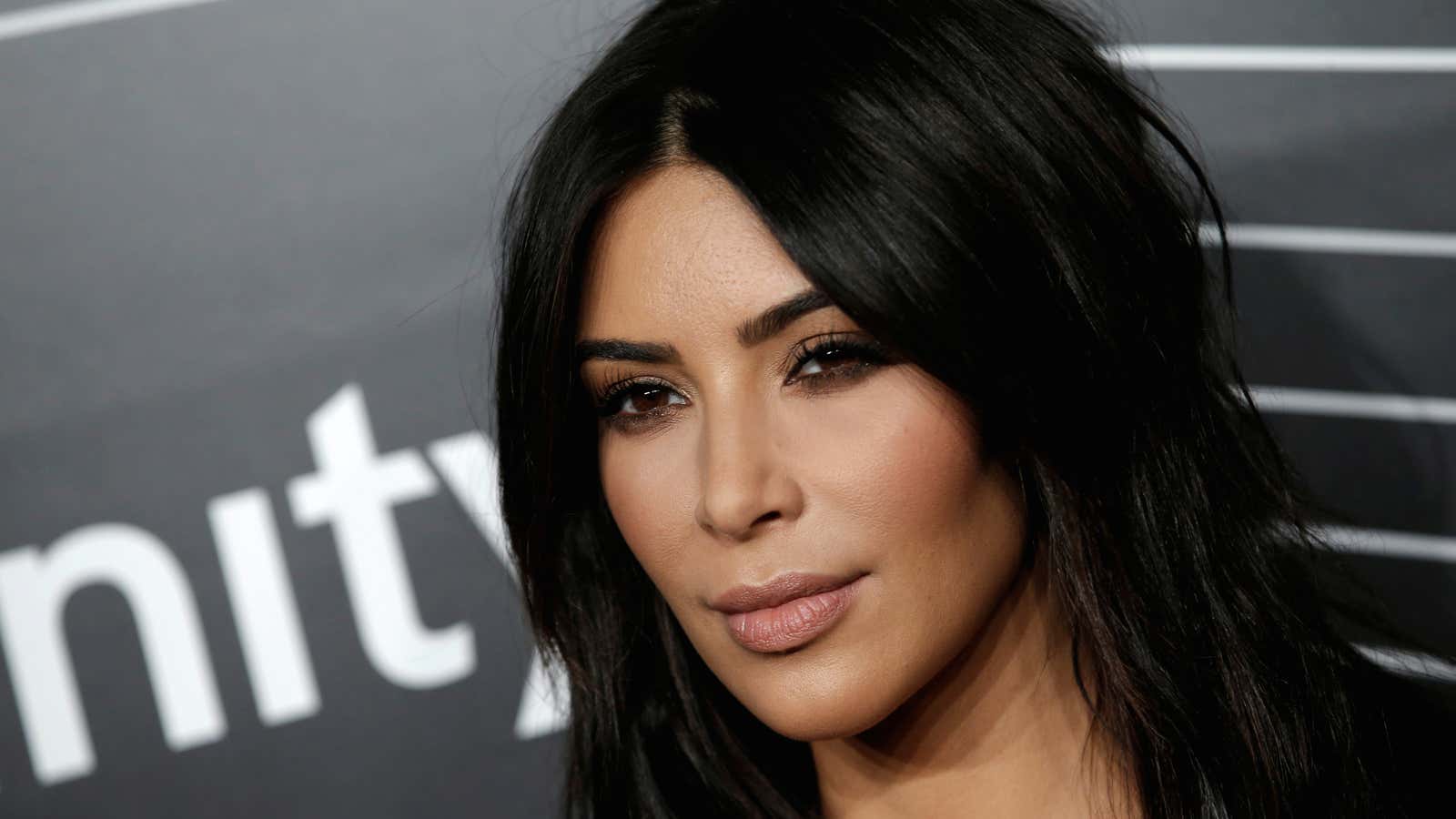Kim Kardashian recently underwent a complicated exercise in cognitive dissonance, declaring on her website that she believes in feminism but is not a feminist herself. ”Why do we have to put labels on things,” she asks. “You’re Republican, you’re Democrat, you’re bisexual, you’re plus-size, you’re poor, you’re a criminal, you’re a mother, you’re a feminist.”
Putting aside the fact that labeling someone a feminist and labeling someone a criminal is a bit of an apples and oranges comparison, Kardashian’s comments underscore a recurring–and frustrating–phenomenon in pop culture. Even as feminism becomes more and more visible, especially in the digital world, it has retained an element of stigmatization running counter to its actual intent. “I feel that being grouped or labeled can create separation between people who do (or don’t) fall into certain categories,” Kardashian continues. “The fight for equality is about ALL human beings being treated equally.”
The reality is that practically all political movements that work toward equality encounter pushback from the status quo. The result is that movements from feminism to Black Lives Matter are often interpreted by American culture as divisive and even violent. This perception suggests that equality is not only widely misunderstood, but on some fundamental level undesired. If activist movements that fight systemic oppression consistently inspire such derision, one wonders if America really does hold dear the value of equality in its basic form.
Kardashian’s position on feminism is a bafflingly contradictory and yet all-too-common sentiment. Actress Sarah Jessica Parker said almost the exact a same thing in a confusing recent interview with Marie Claire:
“I am not a feminist. I don’t think I qualify. I believe in women and I believe in equality, but I think there is so much that needs to be done that I don’t even want to separate it anymore. I’m so tired of separation. I just want people to be treated equally.”
Confounding logic, but also insidious: Parker and Kardashian both argue that feminism is divisive, when in fact it is their rhetoric that is divisive. Parker espouses her belief in equality in one sentence while opposing feminism in the next, as if the two are separate, incompatible concepts. Despite protesting that she believes in women’s empowerment, Parker ends up echoing a highly sexist interpretation that equates feminism with misandry and a kind of militant gender separatism.
A similar misconception has long frustrated Black Lives Matter, a movement driven by one simple message: “Black Lives Matter.” The phrase is very easy to say and just as easy to understand. Yet emerging from the morass of human idiocy is the fear-driven reaction, “All Lives Matter!” For these people, “Black Lives Matter” is egregiously misunderstood as “Only Black Lives Matter.” The racist retort of “All Lives Matter” not only functions as a dismissal of black lives but also reinforces systemic oppression through the erasure of a very real set of racial inequalities in America.
Just like the language harnessed against feminism, the language used against Black Lives Matter employs the strategy of projection. The logic is that these movements are in part responsible for continuing division—whether in the form of sexism or racism—in America. For people who rail against the feminist or Black Lives Matter movements, America has already achieved “equality.”
In the face of such denial, it is the oppressed who must pick up the slack. The responsibility for undoing centuries of systemic inequality ultimately falls on women, on black and brown bodies, on queer, poor, and disabled bodies. They are labeled, sometimes derisively, “activists” because they strive to shake up the power hierarchies that keep us on unequal playing fields. As black lesbian feminist Audre Lorde wrote in a 1980 lecture published four years later in her essay collection Sister Outsider, “Black and Third World people are expected to educate men. Lesbians and gay men are expected to educate the heterosexual world. The oppressors maintain their position and evade responsibility for their own actions.”
We collectively “evade responsibility” by not thinking about what equality means—how it materializes politically, socially, or economically—in a country defined by and celebrated because of its diversity. Does political equality entail reparations? Affirmative Action? Does economic equality demand socialism? We as a nation are deeply divided on these issues.
Equality in America is still more myth than reality—a very American myth perpetuated by an inability or unwillingness to understand the meaning of the word. Feminism is only divisive as long as there are people who believe, deep down, that it is not necessary. And by hiding behind arguments like all lives matter and all people are created equally, people like Sarah Jessica Parker and Kim Kardashian contribute to the very damaging idea that standing for a cause inherently means standing against someone else.
